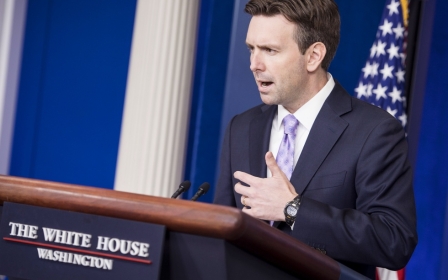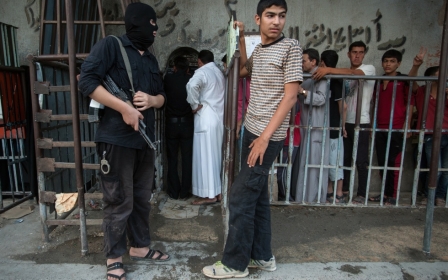Yemen, North Africa al-Qaeda branches urge action against anti-IS coalition

Al-Qaeda branches in Yemen and North Africa called Tuesday for militants in Iraq and Syria to unite against the common threat from a US-led coalition.
In an unprecedented joint statement, al-Qaeda in the Arabian Peninsula (AQAP) and Al-Qaeda in the Islamic Maghreb (AQIM) urged their "brothers" in Iraq and Syria to "stop killing each other and unite against the American campaign and its evil coalition that threatens us all."
The al-Qaeda leadership has disavowed the main target of the US-led campaign, the Islamic State (IS) group that has seized swathes of Iraq and Syria, and has its own branch fighting in Syria, the al-Nusra Front. But the joint statement, released on two al-Qaeda branches' Twitter accounts, called for the groups to set aside their differences in the face of the growing coalition.
"Make the unity of the infidel nations against you a reason for your unity against them," the statement said, while accusing Washington of "leading a Crusader campaign against Islam and all Muslims."
Both the Yemen-based AQAP - considered the network's most dangerous branch - and AQIM rejected IS's declaration of an Islamic caliphate in June and said they remained loyal to Ayman al-Zawahiri, the Egypt-born successor to al-Qaeda founder Osama bin Laden.
Carool Kersten a senior lecturer in the Study of Islam and the Muslim World at King’s College London said that the move was “interesting” given that al-Qaeda have not been regarded as the main target of the new US-led aerial campaign but warned against reading too much into the statement of support.
“In earlier instances, statements from al-Qaeda in Pakistan and Afghanistan [suggest] that [these groups] were not pleased with the proclamation of the Caliphate,” he told Middle East Eye.
“But I can imagine that given this threat now they feel there should be a closing of the ranks of like-minded Islamists.
“That is interesting given the US campaign has focused on the Islamic State. IS so far has not succeed in persuading AQAP or AQIM to defect [to it, which means] that statements should be read in a cautious way and this is not an indication that al-Qaqeda groups are effectively backing IS.”
However, Egypt’s President Abdel Fatah al-Sisi has continued to apply pressure to expand the scope of the US-led alliance to target other groups, in addition to IS.
During a meeting with US Secretary of State John Kerry on Saturday, Sisi stressed that any coalition "should be comprehensive and not exclusively target a specific organisation or eradicate a certain terrorist hotspot," the presidency said in a statement.
Sisi’s Foreign Minister Sameh Shukri went further, insisting that all groups who took “Islam as a cover" must be dealt with.
"We will take all measures that are intended to eliminate this phenomenon altogether, whether in Libya or any other part of the Arab world or in the African continent in particular," Shukri said.
The support of Sunni Arab states is seen as key to tackling the IS threat and the US has announced that ten regional powers have now backed its plans. On Tuesday, US Defence Secretary Chuck Hagel reiterated this stance by stressing that this was “not a West-versus-East issue” and that it was indispensable to have Arab countries and Muslims in particular unify behind the threat.”
Support from local capitals was immediately forthcoming with some analysts suggesting that the US likely had to make concessions in order to secure their support against IS.
However, Shashank Joshi, a research fellow at the Royal United Services Institute, has suggested that the US is unlikely to take Egypt’s suggestion seriously.
“That’s a predictable effort by Egyptian government to co-opt other people into its assault on the MB and try and portray terrorism as a single undifferentiated mass,” Joshi said.
“We’ve seen this in other countries and we have seen [Israeli Prime Minister Benjamin] Netanyahu try to conflate [Islamic State] and Hamas and we now we Sisi conflating [Islamic State] and the Muslim Brotherhood.
“It is an Egyptian attempt to conflate Brotherhood elements with Salafi elements which is an intellectually dubious exercise,” Joshi added.
New MEE newsletter: Jerusalem Dispatch
Sign up to get the latest insights and analysis on Israel-Palestine, alongside Turkey Unpacked and other MEE newsletters
Middle East Eye delivers independent and unrivalled coverage and analysis of the Middle East, North Africa and beyond. To learn more about republishing this content and the associated fees, please fill out this form. More about MEE can be found here.




